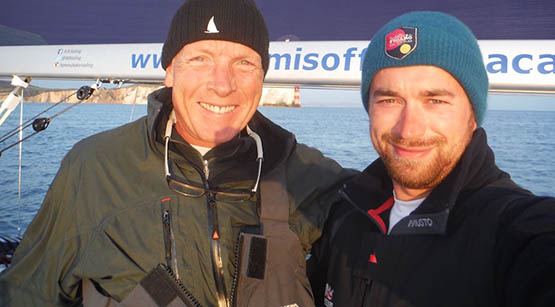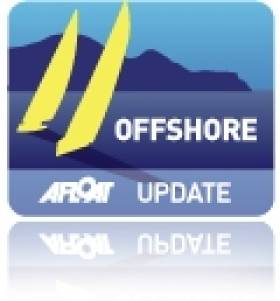Displaying items by tag: Mike Golding
Irish Offshore Sailor Andrew Baker Teams Up with Mike Golding for RORC Cherbourg Race Win
Experience met ambition this weekend, as Northern Ireland Artemis Offshore Academy sailor Andrew Baker teamed up with round the world sailor Mike Golding for the RORC Cherbourg Race.
During the 75nm drag race to Cherbourg, France from Cowes, UK, Baker, from Saintfield in County Down was privy to a sailing master-class from one of the world’s most successful solo racers.
Golding has over 250,000 sailing miles under his belt and has achieved podium success in many of the world toughest offshore races. The British skipper has competed in a record four Vendée Globes, achieving his best result in 2004, third.
Arriving in Cherbourg on Saturday 5th September, Baker and Golding took line honors in IRC 2 aboard Artemis 23, beating 18 other boats to France. The pair finished a respectable 11th overall and were fifth in the double-handed division.
A member of the Royal Southampton Yacht Club, Golding and Baker will team up once again for the IRC Double-handed National Championship later this month.
Five Artemis Offshore Academy Figaros took part in the Cherbourg Race- see their results below. Read Baker’s report on his race with Golding below:

Northern Ireland Artemis Offshore Academy sailor Andrew Baker (right) teamed up with round the world sailor Mike Golding
A few weeks ago, I was offered the opportunity to sail with Mike Golding in the RORC Cherbourg race. Without a second thought I said yes - 75nm sailed with one of the UK’s top solo racers is a lesson worth having. I looked forward to the knowledge and advice Mike would be able to impart during the race.
Before I knew it, it was race day. With Artemis 23 ready to go, I sailed over to Warsash to meet Mike for the first time. Although Mike is one of the UK’s top solo sailors with an incredible record, he was very approachable and any nerves I had quickly disappeared.
We began hoisting sails and preparing the boat for racing, I let Mike take control so he could get a feel for the Figaro one-design. Training session over, we headed to the start line ready for the IRC 2 gun at 1900.
The weather in the Solent was pretty bleak, with grey overcast skies. There was more wind than forecast for the start, but we prepared ourselves for the breeze to drop away into the evening.
Pushed for time, we charged towards the line. It soon transpired, however, that we’d been so deep in race mode that we’d forgotten to bring any spoons. I thought about sailing past Will Harris on Artemis 77 to get some, but we risked being on the back foot for the start. With just five minutes to the gun, we decided our attack on the line. And we never did get any spoons.
Mike and I had a great start. We were just windward of Nick Cherry’s Redshift, with the rest of the Figaro fleet behind. A tight race ensued as we exited the Solent, going head-to-head for the lead with Redshift.
Alongside Hurst Castle and on the lay line for the Needles Fairway – the only mark on our course before France – Mike’s skills really shone. We sailed fast and the shortest course possible, Mike on the helm and me trimming the sails. We were working well as a team. When the breeze increased to over 15 knots - I got a lovely hosing on the bow preparing the spinnaker for hoist.
Our strategy for the Channel crossing could be summed up in three points:
1 – Boatspeed. There was an awkward chop so Mike suggested sailing higher as it was easier to keep the sails stable and the boat moving.
2. Tidal strategy. The tide was going from right to left, so being on starboard was quicker. There were times when we had to be on port gybe so deciding the right moment for this was crucial, but Mike’s experience helped us make the right moves.
3. Covering the fleet. The main advantage of leading a race is that to beat you to the finish, the other boats must sail around you. Covering their moves and keeping your boat between them and the next mark can limit their opportunities to overtake. This is easy to manage with one boat, but less so when they are coming at you from all different directions.
Developing these strategies and thinking them through together really brought home to me the value of having Mike on board. With no prior Figaro experience, he was able to bring new ideas to the race. Every move I wanted to make, he would question and counter, suggesting alternatives that suited his own sailing experience. We bounced ideas off each other, critiquing one another to find the most efficient manoeuvres and tactics. The race – like all yacht races - was about compromise, and our teamwork was invaluable.
Pushing us really hard however, Alan Roberts on Magma Structures soon caught up. Neither Mike nor I got any sleep through the night, as Roberts and the fleet behind him piled on the pressure.
Finally we rounded the breakwater off Cherbourg Harbour and aimed the boat for the finish line. We finished at 0544, happy to be the first Figaro to France, unaware we’d won the IRC 2 handicap class.
After heading ashore for a spot of ‘petit-déjeuner’, we began our delivery back to Cowes. En route back , I got a call from Rob Bunce, delivering the news we’d won the class. The Figaro doesn’t rate very well in the handicap, so it was fantastic to have secured this result – and I had Mike to thank for that. Some hours later, I woke up to a sunset rounding of the Needles - the perfect conclusion to the race.
Sailing with Mike taught me a lot. Undoubtedly, his second opinion won us the race. Having two sets of ideas forced us to debate and then, implement the best of both options. Watching him sail helped me understand more too – observing the points at which he was calm and stressed taught me more about his priorities aboard the boat.
We discussed not only this race but others – past and future - along the way. Hearing his Vendée stories and his Extreme 40 experiences gave me confidence that I’m on the right track. I’m a lot more confident in my abilities after sailing with him, and I look forward to sailing in the IRC Nationals with him later this month.
I almost forgot…his home-made stew scored a solid nine out of ten, despite having eaten it sharing a single teaspoon.
RORC Cherbourg race IRC2 Figaro Results
Position/Boat name/Crew
1. Artemis 23/Andrew Baker, Mike Golding
4. Magma Structures/Alan Roberts, Ian Baylis
6. Chatham Marine/Sam Matson, Hugh Brayshaw
8. Redshift/Nick Cherry, Ed Fishwick
14. Artemis 77/Will Harris, Sam Jacklin
Dubois, who also partnered Mike in the 2007 Transat Jacques Vabre, will join him once again for the legendary French race from Le Havre, France to Puerto Limon, Costa Rica.
Golding, who recently signed a two year sponsorship agreement with Gamesa, a global wind power technology leader, has been overseeing a major optimisation of the yacht that will be dedicated by HRH The Princess Royal at the Southampton Boat Show on Tuesday 20 September 2011.
This will be Golding's seventh consecutive participation in the double-handed Jacques Vabre Race which takes place every two years and is considered the first major event in the Vendée Globe preparation cycle.
"Bruno and I have known each other for many years and I trust him completely as co-skipper on this my first race for Gamesa. As our sailmaker, Bruno and his team at North Sails France provide the real "engines" for Gamesa by providing hi-performance sails that are 'at the same time' fast, efficient and yet strong enough to race around the world. He has a totally unique perspective and knowledge, which I value greatly. As our unofficial 'sail coordinator' his knowledge of the boat and my style of sailing will have a direct impact on our potential in the Vendée Globe."
Always in the upper rankings and many times on the podium, a win in the Transat Jacques Vabre race has eluded Golding. "Clearly we are competing against some new boats this year plus we have been away from the IMOCA circuit for the past two years – however I remain confident that with our newly optimised boat and our combined experience onboard we will be a serious contender for a win in 2011." commented Golding earlier today.
Dubois, who is the Managing Director of North Sails France, commented, "It is a great pleasure for me to sail with Mike again. We have done many races together over the past 10 years including the 2007 TJV. We know each other quite well and do not have much work to do to get along on an IMOCA 60."
























































